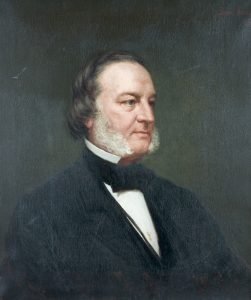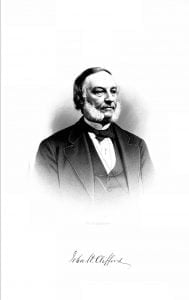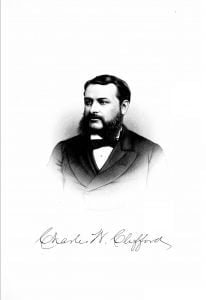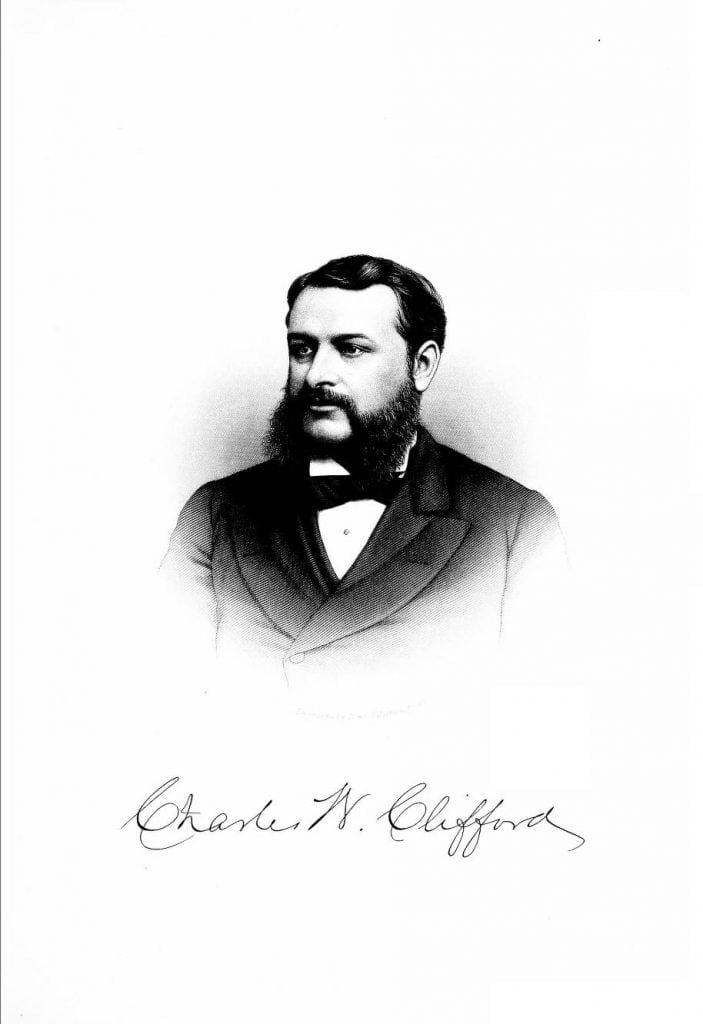Among the most prominent law offices in southern Massachusetts is one which by lineal succession has existed for nearly, if not quite, a hundred years, and in which three generations of the Clifford family have been represented.
Timothy Gardner Coffin, conceded to be the ablest lawyer of his time in southern Massachusetts, was admitted to the bar in 1811 and began his practice in New Bedford. John H. Clifford, who had been a student in Mr. Coffin’s office, and who afterwards became attorney general and governor of the Commonwealth, was admitted to the bar in New Bedford in 1830. For a brief period the partnership of Coffin & Clifford existed. Harrison G. O. Colby, who afterwards became judge of the court of Common Pleas, was also admitted to the bar in 1830. In 1838 the law partnership of Colby & Clifford was formed, and from that time to the present the law office then founded has existed in New Bedford under successive changes. Colby & Clifford was followed by Colby, Clifford & Brigham – Lincoln F. Brigham, afterwards chief justice of the Superior court, becoming a member of the firm. Upon Judge Colby’s appointment to the bench in 1845 the firm became Clifford & Brigham. In 1853 Mr. Clifford became governor of the Commonwealth and Joshua C. Stone, who at one time was judge of the court of Insolvency for Bristol county, joined Mr. Brigham under the firm name of Brigham & Stone. This lasted until 1858, when Judge Brigham was appointed to the bench and Mr. Stone removed to Boston. The office then passed to William W. Crapo, afterwards a member of Congress, who had been a student in the office of Clifford & Brigham, and who was admitted to the bar in 1855. In 1862 Mr. Crapo formed a partnership with Judge Stone, who returned to New Bedford from Boston, and this firm existed until the death of Judge Stone, in 1869. Mr. Crapo then enlarged the firm by taking in as partners George Marston, afterwards attorney general, who was admitted to the bar in 1815, Wendell H. Cobb, afterwards city solicitor of New Bedford, who was admitted to the bar in 1865, and Charles W. Clifford, a son of John H. Clifford, afterwards commissioner on the Revision of the Statutes, 1902, who was admitted to the bar in 1868. The firm name was Marston & Crapo. This firm lasted until 1878, when owing to the conflict of retainers growing out of the Fall River mill disaster it was divided into two firms, Marston & Cobb, and Crapo, Clifford & Clifford, Walter Clifford, a younger son of John H. Clifford, afterwards mayor of New Bedford, and who was admitted to the bar in 1874, becoming a member of the firm. From 1882 until his death in 1886 Frederick C. S. Bartlett, who was a member of the Judiciary committee of the House of Representatives of Massachusetts (1886), and who was admitted to the bar in 1878, was a member of the firm. In 1887 Henry H. Crapo, who subsequently became president of the three street railway companies of southern Massachusetts, and who was admitted to the bar in 1886, became a member of the firm. In 1894 Oliver Prescott, who was admitted to the bar in 1892, recognized as one of the soundest and best equipped lawyers of his time, was admitted to the firm and the name was changed to Crapo, Clifford & Prescott. In 1909 John H. Clifford, a son of Walter Clifford and a grandson of John H. Clifford, who was admitted to the bar in 1904, became a member of the firm. The present members of the firm are William W. Crapo, Charles W. Clifford, Walter Clifford, Henry H. Crapo, Oliver Prescott and John H. Clifford. Walter Clifford and Henry H. Crapo have retired from active practice, the former on account of ill health and the latter on account of the pressure of his duties as president of the trolley system.
The members of the Clifford family who have been such important factors in this old and prominent law firm came of a distinguished ancestry. The late John H. Clifford was a direct descendant in the eighth generation from George Clifford, who came with his wife Elizabeth and son John from Arnold village and parish, Nottinghamshire, England, to Boston in 1644. He was a member of the Ancient and Honorable Artillery Company of that place. The English ancestry of George Clifford is not entirely certain, but he was probably a descendant of the Chudleigh Cliffords. John H. Clifford was also a direct descendant of Thomas Mayhew, governor of Martha’s Vineyard. His sons are also through their mother direct descendants in the ninth generation from Capt. Myles Standish of Plymouth.
From the immigrant ancestor, George Clifford, the lineage of John H. Clifford of New Bedford is traced through:
- John Clifford,
- John Clifford (2),
- Jacob Clifford,
- Jacob Clifford (2),
- Jacob Clifford (3) and
- Benjamin Clifford.
These generations in detail and in regular order follow.
John Clifford, son of George Clifford, the immigrant, was born in 1614 in England. He was three times married, his first wife’s name being Sarah. His second wife, to whom he was married Sept. 28, 1658, was Mrs. Elizabeth Richardson, who died Dec. 1, 1667. His third marriage was to Mrs. Bridget Huggins, who was the widow of John Huggins. Mr. Clifford’s death occurred Oct. 17, 1694, when he was eighty years of age. His children was as follows:
- John (mentioned below),
- Israel,
- Hannah,
- Elizabeth,
- Elizabeth (2),
- Isaac and
- Mary.
John Clifford (2), son of John Clifford and grandson of George Clifford, the immigrant, was born in the year 1645. He settled in Hampton. He was united in marriage, Aug. 18, 1670, to Sarah Godfrey, who was the daughter of Deacon William Godfrey. The following named children were born to this union:
- John,
- Sarah,
- Deborah,
- Mehetebel,
- Jacob,
- Joseph,
- Zachariah and
- John.
Jacob Clifford, son of John Clifford (2), and the fourth generation in the line we are tracing from George, was born April 7, 1679. He was united in marriage with Elizabeth Mayhew and settled in Hampton. Their children were:
- Hannah,
- Sarah,
- Elizabeth and
- Jacob.
Jacob Clifford (2), son of Jacob, born May 11, 1715 (a posthumous child), married Bathsheba Skiff and had a son Jacob.
Jacob Clifford (3), of Tisbury, son of Jacob (2), married Nov. 8, 1770, Elizabeth, daughter of Abraham Smith, of Providence, and they lived in Providence, R. I. They had a son Benjamin. The father died Feb. 3, 1793.
Benjamin Clifford married Sept. 27, 1795, Achsah Wade, and lived in Providence, R. I. Achsah Wade was born Feb. 27, 1774, probably in Rehoboth, Mass., where she was married. She was the daughter of Ichabod and Mary (Peck) Wade, who were married Nov. 24, 1763, at Taunton likely, as their marriage is of record there, and at that time Mr. Wade is referred to as of Taunton, Mass. Their children of Rehoboth town record were:
- Silvanus, born Aug. 28, 1764;
- Lewis, born Sept. 11, 1766;
- Alpheus, born July 26, 1768;
- Ichabod, July 27, 1770;
- Elbannon, born Feb. 27, 1772;
- Achsah, born Feb. 27, 1774;
- Ebenezer, born Feb. 10, 1776;
- Sarah Peck, born Jan. 10, 1778;
- John Leland, born April 25, 1780;
- Mary, born March 5, 1782;
- Comfort, born April 7, 1786; and
- Sally, born July 28, 1788.
The children of Benjamin and Achsah Clifford of Providence town record were:
- Mary Ann, born Nov. 5, 1796;
- Joseph Peck, born Oct. 6, 1798;
- Benjamin, born Dec. 13, 1800;
- Sally Smith, born Nov. 8, 1802;
- a son, born June 12,1804;
- a daughter, born June 12, 1804;
- Lewis Wade, born Aug. 17, 1805;
- Fanny Eliza, born June 5, 1807;
- John Henry, born Jan. 16, 1809;
- William Ebenezer, born Dec. 26, 1810;
- Caroline Achsah, born Oct. 12, 1812;
- Abby, born Feb. 4, 1815;
- Anna, born Feb. 4, 1815; and
- George Edward, born Aug. 20, 1818.

John Henry Clifford, son of Benjamin and Achsah (Wade) Clifford, was born Jan. 16, 1809, in Providence, R. I. He was graduated from Brown University in 1827. He completed his law studies under the direction of Timothy G. Coffin, in New Bedford, and Theron Metcalf, at Dedham, and was admitted to the bar in 1830. He located in the practice of the law in New Bedford and there practiced throughout his lifetime. Mr. Clifford began his public career as a member of the Massachusetts Legislature. He was made one of the aides-de-camp of Governor Everett in 1836 and in 1840 he was appointed by Governor Everett district attorney for the Southern district, an office which he filled with marked ability for nearly ten years. In the meantime, in 1845, he was elected to the State Senate. He was appointed attorney general of Massachusetts in 1849, and in 1850 he was engaged in that most memorable trial of Prof. John W. Webster for the murder of Dr. George Parkman. In the year 1852 the Whig party nominated him for governor of Massachusetts, and although he received nearly 25,000 more votes than either of the opposing candidates he was not elected by the people. On the convening of the Legislature he was chosen to the office by both branches and his inauguration took place Jan. 14, 1853. He declined a renomination and his successor called him to his former office as attorney general, which he held until 1858. In 1862 he was elected to the State Senate and became the presiding officer of that body. He was made president of the Boston & Providence Railway Company in 1867. Governor Clifford was honored with numerous other positions of trust and responsibility. What he always regarded as one of his highest distinctions was his election by the alumni of Harvard College as an overseer of the college – he being a graduate of Brown and his selection as president of the board.
On Jan. 16, 1832, Mr. Clifford was married to Sarah Parker Allen, daughter of William Harland and Ruth (Parker) Allen, the latter a daughter of John Avery and Averice (Standish) Parker, who was a direct descendant from Capt. Myles Standish. Their children were:
- Ruth, born Sept. 23, 1833, died the same day;
- Mary, born March 15, 1836, died Nov. 24, 1842;
- Anna, born Jan. 22, 1838, died March 8, 1909;
- Edward Everett, born May 18, 1840, died Nov. 28, 1842;
- Robert Winthrop, born April 13, 1842, died Aug. 28, 1843;
- Charles Warren, born Aug. 19, 1844, is mentioned below;
- Ellen was born May 3, 1846;
- Walter, Aug, 11, 1849;
- Arthur, April 7, 1857 (died Feb. 26, 1881).

It has been said justly that any sketch of Governor Clifford, however otherwise complete, would do him great injustice which would fail to notice the patriotic course pursued by him during the late war (Civil). From the moment of the attack on Fort Sumter to the close of the contest he gave his whole energies to the support of the administration. His voice and his pen were given with his whole heart to the service of his country. From the very first he never doubted an instant as to what his duty, nor hesitated in performing it. President Lincoln had no truer friend, and he knew it, and General Grant no more earnest supporter in the work of reconstruction. General Grant, in grateful recognition of his patriotism as well as with a desire to secure his services in the diplomatic department of the government, tendered to Governor Clifford the mission to Russia, and afterwards to Turkey, both of which he was obliged to decline.
“But it was as a man, as a private citizen, as a neighbor, as a friend that those who knew him will prefer to remember him. He possessed such traits of character that all who knew him respected him, and those who knew him best loved him most.”
After a brief visit abroad in quest of renewed health Governor Clifford died at his home in New Bedford, Mass., Jan. 2, 1876. On the announcement of his death at the annual meeting of the Peabody trustees at the White Sulphur Springs, in Virginia, in August following, the distinguished statesman Hon. Alexander H. H. Stuart, of that Commonwealth, paid Governor Clifford the following tribute:
“There was a quiet dignity and grace in every movement, and his countenance beamed with intelligence and benignity. To a mind of great power he united a heart which throbbed with generous impulses, and a happy faculty of expression which gave a peculiar charm to his conversation. There was a frankness to his bearing and a genial urbanity about him which at once commanded confidence and inspired good will. Everyone who approached him felt attracted by a species of personal magnetism which was irresistible.”

Charles Warren Clifford, son of John Henry and Sarah Parker (Allen) Clifford, was born Aug. 19, 1844, in New Bedford, Mass. He was prepared for college under the direction of Mr. T. Prentiss Allen, at the Friends’ Academy in his native town. Entering Harvard College at the age of seventeen, he was graduated therefrom in July, 1865, A. M. 1868. Having early decided upon the law as his profession, after his graduation he entered upon his legal studies under the direction of Hon. Edmund H. Bennett, of Taunton; these he continued at the Harvard Law School and later under Hon. John C. Dodge, of Boston. He was admitted to the bar in June, 1868, and began practice in his native city and in the office formerly occupied by his father.
In 1876 Mr. Clifford was appointed one of the commissioners to revise the judiciary system of the Commonwealth. In 1891 he received the most hearty and nearly unanimous support of the bar of Massachusetts for an appointment as judge of the Circuit court of the United States. Subsequently the state of his health at the time prevented his appointment upon the bench of the Supreme judicial court and as judge of the District court of the United States. He was a civil service commissioner of Massachusetts from November, 1884, to July, 1888, being one of the original board which established the present system. Mr. Clifford has served as a com-missioner of the United States Circuit court; a member of the standing committee upon Commercial Law, American Bar Association; and as one of the standing examiners of applicants for admission to the Bristol (Bristol county) bar. In 1898-1901 Mr. Clifford served as one of the commissioners on the Revision of the Statutes of Massachusetts, and in 1904 on the commission for the Revision of the Building Laws. He was counsel for the owners of the “Cape Horn Pigeon” and as such took part in the arbitration between the United States and Russia at the Hague in June, 1902. As counsel for the owners of the “Hope On” he acted in the arbitration between the United States and Chili at Washington in 1886. He prepared the testimony relative to the whaling vessels destroyed by the Confederate cruisers which was presented to the Geneva Arbitration. He was president of the Southern Massachusetts Telephone Company, the National Bank of Commerce of New Bedford and the Harvard Club of New Bedford. He is president of the Masonic Building Association, of St. Luke’s Hospital, the Country Club of New Bedford and the New Bedford Bar Association. He is vice president of the Swain Free School, the New Bedford Institution for Savings and the Massachusetts Bar Association. He is a member of the Bunker Hill Monument Association and the Colonial Society, of the Union Club of Boston and the University Clubs of Boston and New York.
Mr. Clifford has always been loyal in his sup-port of the Republican party; he has served several times as chairman of the Republican city committee; managed the campaign of Hon. William W. Crapo for the gubernatorial nomination in 1882, has been a member of the Republican State central committee, and in 1880 was a delegate to and assistant secretary of the Republican National Convention at Chicago.
Mr. Clifford has been twice married, first May 5, 1869, to Frances Lothrop, daughter of Charles L. Wood, of New Bedford (who died April 28, 1872), and second March 15, 1876, to Wilhelmina H., daughter of the late Governor Crapo of Michigan and a sister of his partner, Hon. William W. Crapo, who died Aug. 23, 1909. His only child (by his first wife) died at birth.
Walter Clifford, son of John Henry and Sarah Parker (Allen) Clifford and brother of Charles W., and also a member of the law firm of Crapo, Clifford & Clifford, of New Bedford, was born in the city named Aug. 11, 1849. He acquired his elementary and preliminary education in private schools and at the Friends’ Academy, New Bedford. He was prepared for college at Phillips Exeter (N. H.) Academy, entered Harvard University and was graduated therefrom A. B. with the class of 1871. In the year following his graduation, 1872, he entered Harvard Law School and was graduated LL. B. with the class of 1875. While maintaining his connection with Harvard Law School he was for one year a student in the office of Messrs. Staples & Goulding, at Worcester, Mass., and while there was admitted to the bar of New Bedford, in June. 1874. In 1875 he became a law clerk in the office of Messrs. Marston & Crapo, of New Bedford, and continued this connection until 1878, when he became a partner in the law firm of Crapo, Clifford & Clifford.
Mr. Clifford has been connected with various business institutions as director, and served several years as vice president of the New Bedford Five Cents Savings Bank. During 1889-91 he was the efficient mayor of his native city. He is a member of the Somerset and Union Clubs of Boston.
On June 5, 1878, Mr. Clifford was married at New Bedford to Harriet Perry, daughter of Charles S. and Sarah (Perry) Randall. Four children have been born to them:
- John H., born May 7, 1879;
- Rosamond, born Aug. 24, 1881;
- Hilda, born July 25, 1883 (married John H. Stedman, of New York, Oct. 14, 1905), and
- Randall, born May 12, 1889.
John H. Clifford, the son of Walter and Harriet Perry (Randall) Clifford and grandson of John H. Clifford, the member of the firm in the third generation, was born at New Bedford May 7, 1879. He was educated at the Groton School and Harvard University, where he graduated in 1902. Having completed his four years’ course in three years, he spent his senior year at the Law School and was admitted to the bar in 1904. He at once entered the law office of Crapo, Clifford & Prescott and became a partner in the firm in 1909.
Mr. Clifford is a trustee of the Sphinx Club of Cambridge, and treasurer of the Harvard Club, the Parish Club and the Art Club of New Bedford, and recently succeeded his father as vice president of the New Bedford Five Cents Savings Bank. He is unmarried.


